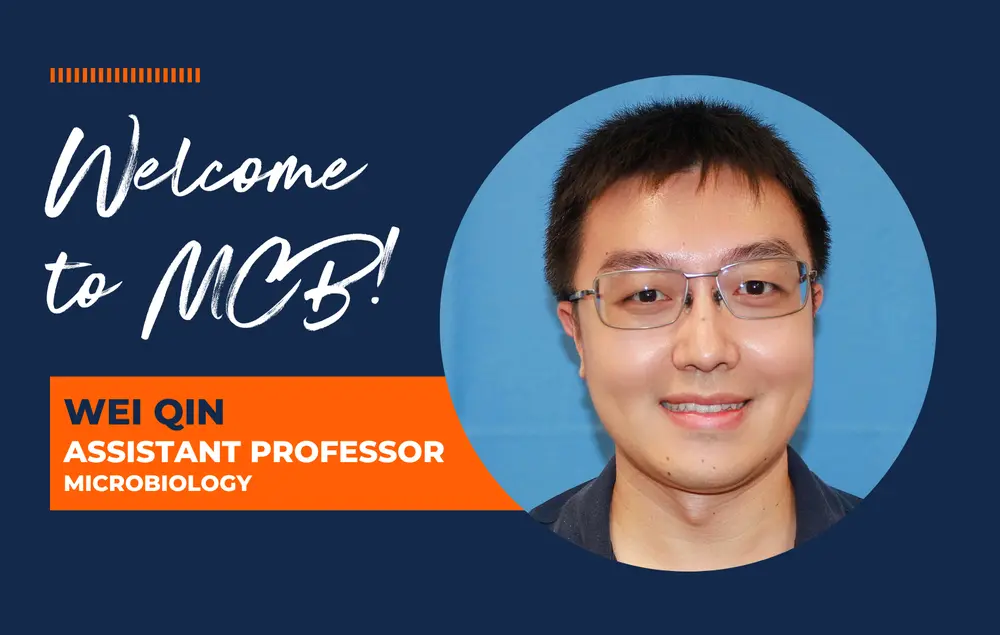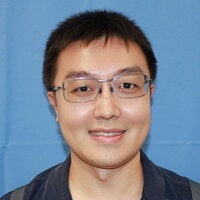
The School of Molecular & Cellular Biology and Department of Microbiology are pleased to welcome new faculty member Dr. Wei Qin. He joined the school as an assistant professor of microbiology in August 2025. Dr. Qin received his PhD in Environmental Microbiology from the University of Washington and was a Simons Foundation postdoctoral fellow at Washington.
Tell us about your lab and your research focus, including how you came to choose or specialize in this area.
My lab is focused on gaining a better understanding of the biogeochemical role of globally significant microorganisms that shape marine and terrestrial nutrient transformations, the ecological principles and environmental controls that govern their distribution, activity, and interaction in natural and engineered ecosystems, and the molecular and metabolic mechanisms that underpin their adaptations and stress responses to anthropogenic perturbations and global change processes.
Our current model microorganisms are nitrifying microorganisms (i.e. nitrifiers), including Ammonia-oxidizing Archaea (AOA), Ammonia-oxidizing Bacteria (AOB), Complete Ammonia oxidizer (Comammox), and Nitrite-oxidizing Bacteria (NOB), which collectively drive the oxidation of reduced forms of nitrogen to nitrate and provide essential links in the nitrogen cycle of natural and engineered systems. We combine culture-based laboratory studies with fieldwork, using genetics, multi-omics, trace metal-clean growth techniques, microsensor measurements, stable isotope analyses, and microscopy to systematically investigate the physiology, molecular biology, ecology, and biogeochemistry of nitrifiers. Our aim is to achieve a holistic, mechanistic, and predictive understanding of their impacts on nutrient transformation, climate, and the environment.
What is especially exciting about this particular area of research, at this time?
Despite their global biogeochemical importance, the physiology and metabolism of nitrifiers remain poorly understood, in part due to the difficulty of obtaining pure cultures from the environment and the very limited availability of genetically tractable systems for these organisms.
My lab has created a library of novel nitrifier cultures that perform key ecological functions in various marine and terrestrial environments. In addition, my lab has recently developed an effective genetic system for model ammonia oxidizer species using a CRISPR system. I am particularly excited to leverage these recent advances in my lab to unravel the “black box” of nitrifier biochemistry, enabling unprecedented mechanistic insights into their adaptive strategies, metabolic pathways, and roles in shaping nutrient cycles.
I am pleased to say I received a 2025 Simons Foundation Early Career Award in Aquatic Microbial Ecology and Evolution for my research, "Assessing nickel utilization in marine urea-N oxidation."
What interested you the most about becoming a faculty member in the School of Molecular & Cellular Biology and Illinois?
The School of MCB and Department of Microbiology at the U. of I. have an international reputation for excellence in microbial physiology research, and are recognized as an ASM Milestones in Microbiology Site. Being able to join MCB is a tremendous honor for me. My PhD advisor, Dr. David Stahl, was a PhD student of Dr. Carl Woese. Many of my former colleagues in microbiology at my previous institution are also proud alumni of the microbiology department at the U of I. Over the years, I’ve heard countless positive remarks about the collegial work environment, supportive colleagues, and outstanding students here. Those connections and impressions, combined with the department’s history and global impact, made the opportunity to become a faculty member here especially meaningful.
What are your teaching interests?
I have taught courses including Microbial Physiology, Fundamentals in Microbiology, and the Capstone in Microbiology, where students learn how to enrich, isolate, characterize, and sequence microbes from environmental samples. I am deeply passionate about teaching, both in delivering knowledge and in engaging students in discussions that spark curiosity and critical thinking about scientific questions. I very much look forward to contributing to the educational mission of MCB by continuing to develop innovative, hands-on microbiology courses and by exploring opportunities to expand the curriculum into other areas of microbiology.
If any students (undergrad or grad) are interested in working in your lab, what's your advice or how can they get in touch with you?
I welcome both undergraduate and graduate students to contact me about opportunities to work in my lab. I am especially passionate about supporting undergraduates in gaining hands-on research experience in research labs. At my previous institution, I developed a course that invited microbiology lab PIs from across campus to give lectures, share their lab’s research, and highlight available research opportunities for undergraduate students. I was honored to receive the Nancy L. Mergler Faculty Mentor Award for Undergraduate Research in recognition of my commitment to undergraduate mentoring.
At the U. of I., I will continue to support research opportunities for both undergraduate and graduate students. Interested undergraduates are encouraged to send me an email at weiqin@illinois.edu with a brief introduction, including their backgrounds, research interests and future career goals. Prospective graduate students should also include a short research statement. From there, we can arrange a meeting to discuss potential opportunities. I am excited to hear from you!
Tell us about someone who made a difference in your life, such as someone who sparked your interest in biology, who encouraged you to pursue a career in academia or challenged your thinking about a topic.
I have been very fortunate to have supportive mentors and teachers throughout my student, postdoctoral, and early career stages, guiding me in my career choices and professional development. The most influential has been my PhD advisor, Dr. David Stahl. I am honored to have been Dave’s last PhD student. His dedicated mentorship and ability to inspire critical thinking about scientific questions have shaped the way I approach research and benefited me for a lifetime. He has also been an outstanding role model as a scientist and microbiologist, and his influence has been pivotal in my career path.
In addition, when I started my new lab at my previous institution during the peak of the COVID pandemic, my faculty mentor, Dr. Jizhong (Joe) Zhou, provided tremendous support. Coming from a marine microbiology background, I was new to soil microbial ecology, and Joe became my guide into this field. His support and mentorship were instrumental in my transition at an independent PI and in receiving my Department of Energy Early Career Research Award.
What do you like to do in your free time?
In my free time, I love spending time with my family. My wife, a film and cinema studies scholar, often chooses a movie for us to watch together, and by the end, our different tastes guarantee a lively mix of opinions—basically turning our living room into a tiny film festival with its own spirited Q&A. I also get endless joy from watching our son grow and caring for our two adopted cats, Milky and Tigi, who believe they run the household. I played the violin for over a decade, and I look forward to picking it up again when the time feels right.
